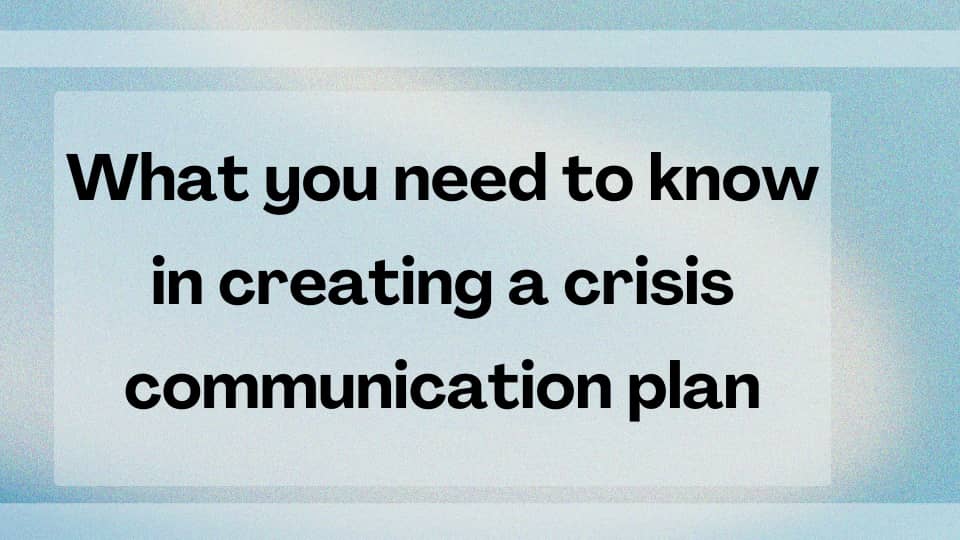Crisis Communication Plan: What You Need to Know

In the business and corporate world, having a crisis communication plan is very important because crises are almost inevitable. Whether it’s a social media firestorm, a product recall, or a scandal involving key executives, how an organization responds can make or break its reputation. That’s why having a robust crisis communications plan is crucial. In this article, we have discussed some key insights into building an effective crisis communications plan.
One of the first steps in developing a crisis communications plan is having a thorough risk assessment to identify potential crises. These could include anything from natural disasters to data breaches to negative media coverage. By anticipating these scenarios, an organization can be better prepared to respond swiftly and effectively when they occur.
Another important aspect of a crisis communications plan is establishing clear communication protocols. This includes identifying key spokespersons, establishing chains of command, and setting up monitoring systems to track media coverage and social media chatter. By having these protocols in place, the organization can ensure that accurate and timely information is disseminated to the public.

Furthermore, the plan should incorporate a process for media relations. This includes establishing relationships with key media contacts, preparing media statements, and organizing press conferences if necessary. The goal is to ensure that the organization’s message is communicated accurately and effectively to the media and the public.
Social media has become a major player in crisis communications. In the event of a crisis, social media platforms can be used to provide real-time updates, address customer concerns, and manage the narrative. However, it’s important to approach social media with caution, as missteps can quickly escalate a crisis.
This explains why an effective and robust crisis communications plan will require that a crisis communications team is set in place. The plan should outline clear roles and responsibilities for the crisis team. This team should be composed of individuals from various departments, including public relations, legal, and senior management staff, to ensure a coordinated and cohesive response. Each member should understand their role and be prepared communications to act swiftly in the event of a crisis. Crisis management training and simulation is also advisable to guide individuals on what to expect in real life.
While it is important to have a crisis communications team, it is worthy of note that in a crisis, the business leader leads the conversations and the professionals in communications and public relations provide advisory. It is therefore important that high networth individuals, business leaders and brand managers understand how to handle a crisis response. Communications practitioners ought to create avenue to conduct crisis management trainings for the senior executives of the organization and clients ahead of any crisis. Click here to learn why effective leaders must be excellent communicators
In developing a crisis communications plan, it is important to monitor the scale of the crisis in order to ensure the negative attention coming from different channels moves away from your brand as quickly as possible and responses are targeted at the amplifiers. Often, a crisis is an offshoot of an issue that was allowed to linger for longer than necessary but once a crisis emerges, what is done within 24 hours will determine if it grows into a complex crisis. This is why a crisis communication plan is important because it ensures early preparation to de-escalate potential risks to the reputation of an organization or entity.
After the crisis has been resolved, it is important to review the organization’s response and identify areas for improvement. This could include updating the crisis communications plan, providing additional training for team members, or implementing new technologies to enhance crisis response capabilities. Conducting post-crisis evaluations is vital for learning and improving. In a post-crisis evaluation, the crisis communication team analyses what worked well and what could be improved upon. This helps organizations refine their crisis communication strategies for the future. By studying past crises, businesses can identify patterns, assess their response effectiveness, and develop more resilient plans.
It is important to note that a crisis communication plan is effective when the crisis was properly managed to prevent it from attracting public views. In this scenario, the crisis is contained by the team to avoid it from going viral.
Building a crisis communications plan is an essential part of any organization’s risk management strategy. By identifying potential crises, establishing clear communication protocols, and leveraging social media effectively, your organization can weather the storm and emerge stronger on the other side. In this video, Sola Abulu spoke on Managing Social Media Crisis: Understanding the Dos and Don’ts
You can still leverage on our Issues, Crisis and Reputation Management Course to learn how to de-escalate and sustainably manage complex issues and crisis!!
Hurry now to sign up via this link.
